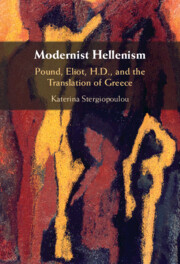Book contents
- Modernist Hellenism
- Modernist Hellenism
- Copyright page
- Dedication
- Contents
- Acknowledgments
- Abbreviations
- Introduction
- Part I Hellenists and Modernists
- Part II “I don’t want to write it”
- Chapter 3 “What is Greece if you draw back?”
- Chapter 4 “Who fished the murex up?”
- Part III Tragedy and Translation in Late Modernism
- Part IV The Long Imagist Poem
- Bibliography
- Index
Chapter 4 - “Who fished the murex up?”
The Distillation of Ion
from Part II - “I don’t want to write it”
Published online by Cambridge University Press: 21 November 2024
- Modernist Hellenism
- Modernist Hellenism
- Copyright page
- Dedication
- Contents
- Acknowledgments
- Abbreviations
- Introduction
- Part I Hellenists and Modernists
- Part II “I don’t want to write it”
- Chapter 3 “What is Greece if you draw back?”
- Chapter 4 “Who fished the murex up?”
- Part III Tragedy and Translation in Late Modernism
- Part IV The Long Imagist Poem
- Bibliography
- Index
Summary
This chapter considers H.D.’s translation of Euripides’s Ion (1937). H.D.’s Ion crystallizes her approach to Greek, redefining the practice of translation in the process; allows her to propose an alternative theory of psychic development contra Freud; and, finally, in its specific (mis)reading of the Euripidean play, foreshadows Pound’s treatment of Sophocles in Women of Trachis by making a strong case for the poetic and cultural relevance of Greek tragedy in the twentieth century. Pushing beyond accounts of the play available to her in the 1930s, H.D.’s interpretation of Euripides’ poetic strategies aligns with more recent scholarly accounts of his plays. Deploying differently the elements of commentary and translation in her multigeneric work, H.D. dramatizes both her own desire to believe in a triumphant narrative that would bind ancient and modern culture and would make poetry the cure or compensation for trauma, and the contingency or constructedness of such a position. The analysis of Ion is bookended by examinations of “Murex” (1926), and Trilogy (1944–46) that show the germination and evolution of the questions, ideas, and techniques that went into the translation of the play.
Keywords
- Type
- Chapter
- Information
- Modernist HellenismPound, Eliot, H.D., and the Translation of Greece, pp. 196 - 244Publisher: Cambridge University PressPrint publication year: 2024

